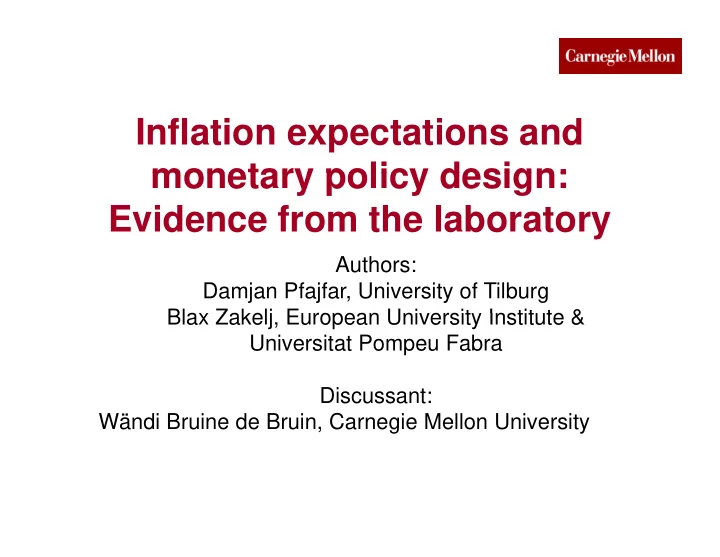

Inflation expectations and monetary policy design: monetary policy design: Evidence from the laboratory Authors: Damjan Pfajfar, University of Tilburg Blax Zakelj European University Institute & Blax Zakelj, European University Institute & Universitat Pompeu Fabra Discussant: Wändi Bruine de Bruin, Carnegie Mellon University
Important paper • Central banks follow consumers’ inflation expectations because of their effect on t ti b f th i ff t consumers’ financial decisions and macro- economic trends economic trends • Median inflation expectations as reported on consumer surveys tend to follow official inflation consumer surveys tend to follow official inflation estimates, but.. – … there is large heterogeneity – … relatively little is known about how consumers form their inflation expectations
Strengths of present work of present work • Carefully controls the environment in which i fl ti inflation expectations are made t ti d • Presents all relevant information about previous periods allowing for analysis of how it affects periods, allowing for analysis of how it affects inflation expectations • • Examines effect of policy actions on inflation Examines effect of policy actions on inflation expectations
Main findings Main findings • Formation of inflation expectations – 40% are rational – 35% extrapolate trend – 20% use adaptive learning and sticky information 20% use adaptive learning and sticky information strategies – 5% behave adaptively p y • Monetary policy can reduce heterogeneity in inflation expectations
Process data • The paper compares people’s behavior with model behavior to indirectly examine the d l b h i t i di tl i th processes used to form inflation expectations • • Hypotheses could have been directly tested with Hypotheses could have been directly tested with process-tracing measures – Think-aloud protocols Think aloud protocols – Eye-movement tracking – Mouse-click tracking (previously used by economists) g (p y y ) • Process-tracing data would likely support the indirect analyses
Experiment vs real world vs. real world • The results of the controlled experiment are not replicated with the Michigan Survey of li t d ith th Mi hi S f Consumers (Pfajfar & Sanotoro, 2010) – While 40% of participants acted rationally only 7% of While 40% of participants acted rationally, only 7% of Michigan respondents did so – While 20% of participants used adaptive learning and sticky information models, 44% of Michigan respondents did so • The controlled experiment gives an optimistic The controlled experiment gives an optimistic view of what people can do
In the experiment In the experiment • All relevant information was provided at no cost All relevant information was provided at no cost • Irrelevant information that might otherwise confuse people was not provided p p p • Incentives for accurate expectations • Highly educated (undergrad) sample Highly educated (undergrad) sample • Interested sample (216 of 2500 participated)
In the real world In the real world • Cost of information search Cost of information search • Irrelevant information might confuse people • No (explicit) incentives for accurate expectations No (explicit) incentives for accurate expectations • Less educated consumers • • Disinterested consumers Disinterested consumers
How people form answers to the Michigan question h Mi hi i • I In process-tracing interviews, more than half of i t i th h lf f t i consumers thought of specific prices (gas, food) rather than official inflation estimates rather than official inflation estimates • In follow-up surveys, participants who thought more of specific prices (vs official inflation more of specific prices (vs. official inflation estimates) gave more extreme inflation expectations p
Questions Questions • What can we do to help consumers form more accurate expectations of inflation? accurate expectations of inflation? • Would consumers benefit from having more accurate inflation expectations, in the sense of accurate inflation expectations in the sense of making better decisions? • Do consumers actually act on their inflation o co su e s actua y act o t e at o expectations (including those with seemingly inappropriate expectations)?
Recommend
More recommend